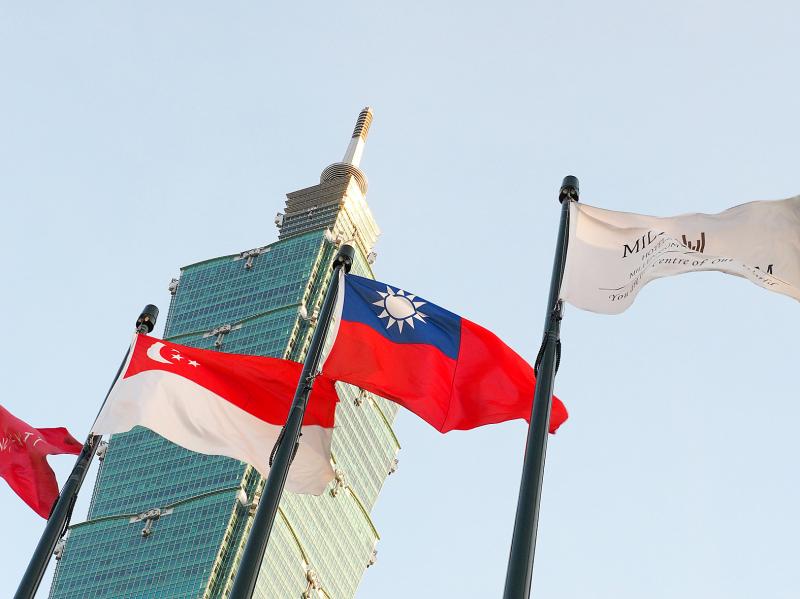Moody’s Investors Service yesterday affirmed Taiwan’s sovereign credit rating of “Aa3” and changed its credit outlook for the nation to “positive” from “stable,” the first time the ratings agency has given the nation that credit outlook since 1994.
“The decision to change the outlook to positive from stable reflects increasing signs that Taiwan’s economy is more resilient and that its governance strength is stronger than previously assessed,” Moody’s said in a statement.
The Ministry of Finance welcomed the agency’s move.

Photo: David Chang, EPA-EFE
“This is the first time Moody’s has raised its outlook for Taiwan since 1994, when it first issued its sovereign credit rating,” the ministry said in a statement.
“The positive outlook indicates that the nation’s sovereign rating may be upgraded within one year,” it said.
Taiwan’s export-oriented high-tech manufacturing sector has benefited from demand for semiconductors amid the global surge in remote working, and it is likely to boost the nation’s competitiveness in the medium term, Moody’s said.
That is because changes in people’s behavior and work practices amid the COVID-19 pandemic would continue to boost demand for Taiwan’s products, while the nation’s track record of sound policy effectiveness, aided by robust fiscal and external positions, supports its credit profile, Moody’s said.
Taiwan’s strong fiscal and external buffers would remain intact through the pandemic shock, and continue to strengthen compared with other Aa-rated peers, it said.
However, ongoing geopolitical tensions and the nation’s aging demographic would remain constraints for its credit profile going forward, it said.
Taiwan’s real GDP growth is expected to accelerate to 3.7 percent this year, from 3.1 percent last year, while its fiscal deficit to GDP is predicted to fall to 1 percent this year from an estimated 2.1 percent last year, which Moody’s said is considerably lower than the median fiscal deficit of between 3 and 5 percent of GDP for other Aa-rated economies.

South Korea’s equity benchmark yesterday crossed a new milestone just a month after surpassing the once-unthinkable 5,000 mark as surging global memory demand powers the country’s biggest chipmakers. The KOSPI advanced as much as 2.6 percent to a record 6,123, with Samsung Electronics Co and SK Hynix Inc each gaining more than 2 percent. With the benchmark now up 45 percent this year, South Korea’s stock market capitalization has also moved past France’s, following last month’s overtaking of Germany’s. Long overlooked by foreign funds, despite being undervalued, South Korean stocks have now emerged as clear winners in the global market. The so-called “artificial intelligence

NEW IDENTITY: Known for its software, India has expanded into hardware, with its semiconductor industry growing from US$38bn in 2023 to US$45bn to US$50bn India on Saturday inaugurated its first semiconductor assembly and test facility, a milestone in the government’s push to reduce dependence on foreign chipmakers and stake a claim in a sector dominated by China. Indian Prime Minister Narendra Modi opened US firm Micron Technology Inc’s semiconductor assembly, test and packaging unit in his home state of Gujarat, hailing the “dawn of a new era” for India’s technology ambitions. “When young Indians look back in the future, they will see this decade as the turning point in our tech future,” Modi told the event, which was broadcast on his YouTube channel. The plant would convert

‘SEISMIC SHIFT’: The researcher forecast there would be about 1.1 billion mobile shipments this year, down from 1.26 billion the prior year and erasing years of gains The global smartphone market is expected to contract 12.9 percent this year due to the unprecedented memorychip shortage, marking “a crisis like no other,” researcher International Data Corp (IDC) said. The new forecast, a dramatic revision down from earlier estimates, gives the latest accounting of the ongoing memory crunch that is affecting every corner of the electronics industry. The demand for advanced memory to power artificial intelligence (AI) tasks has drained global supply until well into next year and jeopardizes the business model of many smartphone makers. IDC forecast about 1.1 billion mobile shipments this year, down from 1.26 billion the prior

People stand in a Pokemon store in Tokyo on Thursday. One of the world highest-grossing franchises is celebrated its 30th anniversary yesterday.